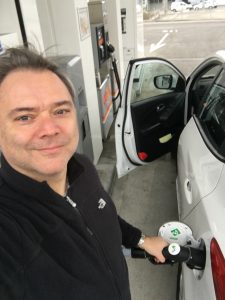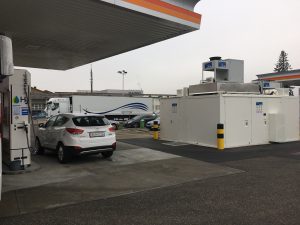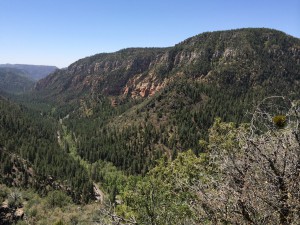Yesterday was a highlight. My First Ride in a Hydrogen Fuel Cell Car
The first time for one of my business trip I drove a hydrogen propelled fuel cell car. A Hyundai ix35.

Dr. Artur Braun filling Hyundai ix35 fuel cell car with hydrogen at the COOP pronto gas station in Hunzenschwil, Switzerland.
Since 2008, major part of my scientific activity was the production of solar hydrogen in photo electrochemical cells. Together with my group members and our collaborators worldwide we have run experiments, done investigations, wrote research proposals to get project funding, supervised PhD theses, MSc theses and BSc theses for this topic, wrote publications, participated in and spoke on conferences, organised conferences and so on, and so on.
For almost 10 years I, we, an entire community worldwide which has demonstrated and experienced an explosion rate growth, had a great time for a new technology for renewable energy production. I felt the time is coming that this solar hydrogen technology is going to make it into the market.
Lately, my organisation has built a hydrogen pumping station where you can fill your car with hydrogen, provided it feeds on hydrogen. And more recently, a major grocery retail store chain in Switzerland, the COOP company established a hydrogen filling station at one of their many COOP pronto gas stations in Hunzenschwil in the Canton of Aargau. It came in the news, in the TV, in the internet.
On 10 November 2016 I participated as a founding member in the inauguration of the Daylight Academy, a new institution funded by the VELUX Stiftung in Switzerland. The foundation promotes the use of daylight for humankind. The inauguration ceremony took place at the WSL, the Swiss Federal Institute for Forest, Snow and Landscape Research in Birmensdorf.
For my business travels in Switzerland I frequently use the vehicles of my employer’s car pool. I did so for the travel to the inauguration to Birmensdorf WSL, because on the next day I would have another very early ride to EPFL in Lausanne. On my way back at night from the Daylight Academy inauguration I gave my colleague Dr. Rudolf Struis from Paul Scherrer Institute a ride to the train station. He had also participated in the inauguration workshop and ceremony. In the car we discussed many things, also our work on environmental sustainability and the use of car pooling. Then it popped up in my memory that my employer had recently acquired a hydrogen fuel cell vehicle from Hyundai. So I told him that my next booking of a vehicle from the car pool would be the fuel cell car.
This was exactly yesterday on the 16 December where I visited him and two of his colleagues for a project discussion on a synchrotron experiment on dye sensitised solar cells which we are planning for.
The fuel cell car was a spacious sports utility vehicle which reminded me of my 2001 Grand Jeep Cherokee. But the Hyundai appeared to me more speedy. I did not feel the heavy weight which I was used from the Jeep. Push the gas pedal and the fuel cell car speeds of. It had automatic transmission and was easy to use. Actually, I did not really notice this was a fuel cell car when driving it. It felt like any normal car.
One problem at this time is that there are not many hydrogen gas stations. In Switzerland there is one at Empa in Dübendorf by Zürich. And the one at COOP in Hunzenschwil. There was one near Lac Le Man which is currently being moved to Neuchatel. And there is a research hydrogen station in Martigny operated by EPFL. That’s about it at this time.
Have we finally arrived at the fuel cell vehicle age?
Has The Transition From Fossil Fuel to Hydrogen Economy Finally Begun?
When I was Physics student in Aachen, some of my Korean friends studied Maschinenbau, some of them were in the groups of Prof. Franz Pischinger, an internationally renown Professor for combustion engine technology.
When I moved to Switzerland for my doctoral thesis, I entered the field of electrochemistry. My PhD thesis research project was funded by the Swiss Priority Program on Materials Research and was supposed to produce an electrochemical double layer capacitor, a “Supercapacitor” to be used in electric locomotive trains. So I worked in a project on alternative energy for mobility applications with Dr. Rüdiger Katz, my supervisor.
In 1998 or 1999, I do not remember exactly anymore, I joined a brainstorming led by ETH Professor and PSI Director Meinrad Eberle, where a project on fuel cell vehicles had been discussed. While Prof. Eberle was known as a hardcore automotive combustion engineer, he listened to the various minds in the brainstorming and in the end basically said “OK, then let’s go for the fuel cell car project”. I thought for a classical combustion engine guy like Eberle this would be a big move.
I knew about the fuel cell for automotive applications since I joined PSI as a PhD student in 1996. I shared my office with Dr. Felix Büchi, a fuel cell stack expert and Dr. Hans-Peter Brack, a polymer membrane expert. On a side note, I want to acknowledge that learned a lot from them during my three years at PSI.
So, anyway – the big expectations and frequent doubts over fuel cell cars that I witnessed in the late 90s – here it is, the fuel cell car which runs on hydrogen. I drove it.
Where does the hydrogen for the fuel cell cars come from?
Most of the hydrogen produced by chemical industry is made from water vapour guided over hot coal. The water-gas-shift reaction makes that the water H2O molecule is split into hydrogen gas and oxygen, the latter combines with the coal to carbon monoxide CO, a toxic gas. This process can be called thermolysis. So, this hydrogen is won from fossil fuels.
The water can also be split (oxidised) and converted to hydrogen and oxygen by electrolysis. The electric power necessary for this process can be taken from the electricity grid. The electricity can be produced from coal and gas power plants, from nuclear power plants, from wind and maritime tide power plants and also from photovoltaic – from solar energy. The exhaust of a fuel cell car is only water vapour.
The electric power for the hydrogen I pumped at COOP pronto in Hunzenschwil comes directly from a Swiss mountain water power plant. So this hydrogen comes from renewable energy. In contrast, the combustion engine cars with imported fossil fuel, which produces as exhaust water, carbon dioxide and possible other reaction products, such as the NOx.

